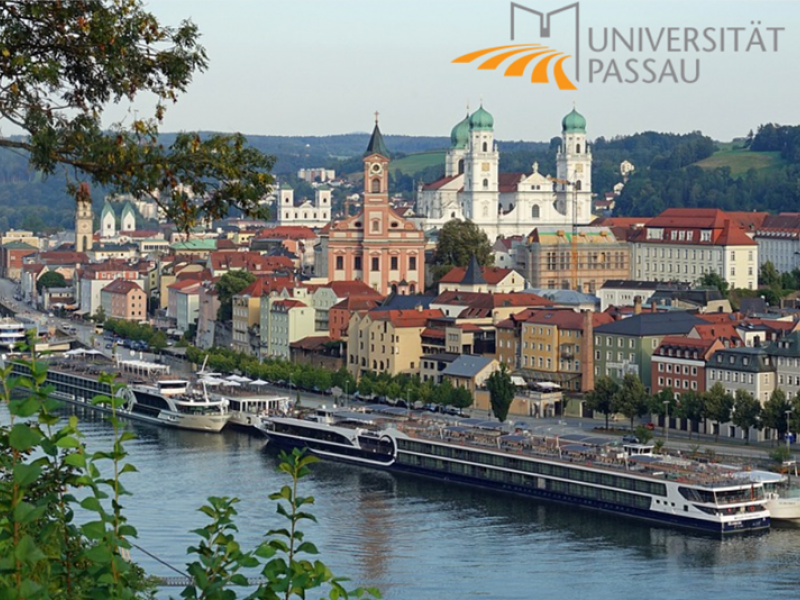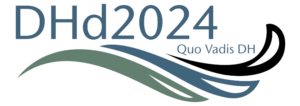TCDH at DHd2024 in Passau
DHd2024 #Quo Vadis DH?

Date:
26.02.2024 bis 01.03.2024Categories:
ConferenceContact:
Dr. Joëlle WeisFurther Information:
Webseite der Konferenz
It has been ten years since representatives of the Digital Humanities association in the German-speaking area gathered for the first time for what has now become an annual conference held in various locations in Germany and the German-speaking countries. DHd2024 provides an opportunity, after a decade, to take stock and develop future perspectives within the discipline. Not only has the community grown steadily over the past ten years, but the research fields and applications of digital humanities have also changed and evolved. Digital work methods and techniques have become commonplace in research and in all areas of life; digitization has become part of public discourse, think of Artificial Intelligence or Big Data. Therefore, DH has always been tasked with accompanying and significantly contributing to this process, especially in formulating interpretations and providing assistance.
The TCDH is also participating with several contributions to the conference:
Ariadne Baresch, along with colleagues, will conduct a workshop on "Video Analysis with the TIB-AV-A Platform: Fundamentals, Interfaces, Future Perspectives".
The interest of the DH community in film and video analysis has grown significantly in recent years. Videos are typically multimodal, and analyses based on manual annotations take up a lot of time. Therefore, computer science methods of pattern recognition for (semi-)automatic evaluation of the various modalities are of great importance, as they can provide researchers in Digital Humanities with information about the internal dynamics of individual videos or entire corpora. However, developments in Artificial Intelligence and the field of machine learning are progressing rapidly, and the implementation of current methods requires comprehensive technical understanding and many computational resources. The web-based platform "TIB AV-Analytics" (TIB-AV-A) provides a low-threshold access to systematic film and video analysis. The goal of the workshop is to introduce TIB-AV-A, provide hands-on experience, present data import and export, and furthermore, to actively work on a community for TIB-AV-A. Therefore, the developers of TIB-AV-A also collaborate with the DHd AG Film & Video.
Another workshop, "Microblogging with Mastodon: Fediverse, Fedihum and Co. in the Digital Humanities – a Practical Workshop" is led by Vivien Wolter and colleagues.
Those looking for scholarly online communication, networking, and exchange no longer need to rely on powerful commercial social media platforms. The Fediverse provides a decentralized alternative based on free software and open interfaces. But what should the first (and second) steps in the Fediverse look like? Where can one find Digital Humanists and Digital Humanities topics? Are there tools for automated posting à la autoChirp also for Mastodon? This half-day workshop addresses these questions from a practical perspective. The focus is on exploring, testing, and discussing the potentials of the microblogging service Mastodon for DH researchers for science communication, community building, and teaching. In addition to the DHd Mastodon instance Fedihum, the new service for automated posting of Trots, autodone, will be introduced and gradually put into practice through practical exercises.
Damir Padieu, a student of Digital Humanities at the University of Trier and former employee at the TCDH, serves as one of the chairs of the panel "Between Multilingualism and Resource Gap: Quo Vadis 'Small Disciplines' in the German-speaking Digital Humanities?".
So-called 'small disciplines', as well as researchers specialized in regions of the Global South or other countries of the world in all disciplines, are repeatedly confronted with challenges in resources, tools, and infrastructures in their digital research. These challenges include the availability of data and metadata in various languages, especially in non-Latin scripts, the usability of tools, as well as general support for building data corpora. The panel addresses these issues and discusses, based on user stories of the panelists from Arab Studies, Computational Linguistics, Religious Studies, Romance Studies, Sinology, and Ukrainian Studies, both general questions about inequalities in infrastructures for various scripts and languages, as well as concrete examples of the impact of these resource gaps in DH. Finally, future perspectives for strengthening multilingual-oriented DH in the so-called small disciplines and beyond should be formulated.
Additionally, posters by Prof. Dr. Christof Schöch and Dr. Joëlle Weis will be presented.
Christof Schöch presents his poster on "Curation and Analysis of 'XVIIIe siècle: Bibliographie'".
This contribution describes the curation and analysis of "XVIIIe: Bibliographie", published by Benoît Melançon in regular installments since 1992. The bibliography is focused on scholarly publications about the (French) Eighteenth century. In 2023, Melançon published a complete set of references for the years 1992-2022, containing about 64.400 entries. The tabular format provided by Melançon was first transformed into BibTeX for publication on Zotero, where the bibliography can now be consulted. The data was also exported to Zotero RDF for analysis. So far, analyses have been performed concerning the publication types, languages, themes and co-authorship patterns that can be observed in the bibliography. The poster aims to showcase this unique resource, provide insight into strategies for the curation and modeling of bibliographic data, and highlight some of the findings about the publication habits of the research community whose work is documented by the bibliography. Further information: https://christofs.github.io/BIB18/.
Joëlle Weis and colleagues present their poster on "The Memoirs of Countess Schwerin (1684-1732): Towards the Digital Edition of a Unique Self-Testimony".
In the 1720s, Countess Luise Charlotte von Schwerin wrote down her memoirs. These provide a detailed account of her life and her conversion from the Reformed to the Catholic faith in 1719 in Vienna, offering a unique insight into the life of a woman at that time, who was subsequently banished from Prussia and had to build a new existence. In her memoirs, she paints an exceptionally precise picture of the scope of action and networks of women in the early 18th century. As part of a research project funded by the FWF, a digital edition will be created, making the text accessible for research in both French and German translation and providing background information. The poster will focus on the applied methods and initial results of the project and introduce the data model, with a special focus on social relationships.

